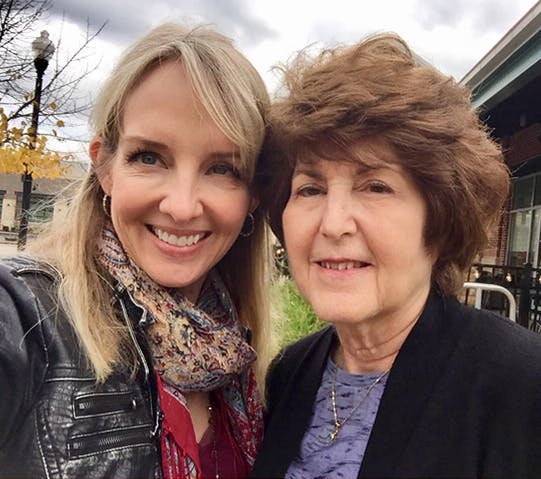My Peer Guide was by far the greatest source of hope and comfort to me when I was first diagnosed. If I can provide even a fraction of that relief to other people experiencing chordoma, it will have been worth it.
-Susan Hall, sacral survivor and Peer Guide trainee
Before she was diagnosed with chordoma, Susan Hall had never been hospitalized a day in her life. Fit and active, she initially took the pain in her tailbone to be a pinched nerve before an exploratory MRI uncovered a tumor “the size of a chubby caterpillar.” It was Labor Day weekend of 2016, and the time between learning she had a tumor on Friday and getting into the doctor’s office to have a biopsy on Tuesday felt like an eternity. When she learned the following week that she had a sacral chordoma, the news rocked Susan to her core.
“I immediately began searching for information online and stumbled across the Chordoma Foundation’s website. That’s where I learned about the Peer Connect Program. I submitted a request that night and got a call a few days later from the Guide I’d been matched with, Susan Garbett. We talked for an hour and a half, and I felt physically lighter after our conversation. That’s when I realized I could get through this.”

Susan Hall and Susan Garrett, chordoma survivors and Peer Guides
About Peer Connect
Launched in 2011, the Peer Connect Program is a free, confidential peer-to-peer support program that connects anyone touched by chordoma with another person whose experiences are similar. Over nearly a decade, it has fostered hundreds of matches and cultivated life-changing relationships between affected individuals. Our trained Peer Guides support chordoma patients at every stage of their journeys—from initial diagnosis through the end of treatment and beyond—as well as any caregivers, family members, or friends seeking to reduce feelings of isolation and stress.
Over the years, they have volunteered thousands of hours to provide a listening ear, serve as a sounding board, and, if requested, connect their Peer Partners with reliable information and resources.
New online training format
Today, we are proud to introduce a new online training designed to make the process of becoming a Peer Guide more accessible than ever. By eliminating the requirement of attending in-person training, more people will be able to participate and connect with the lessons at their own pace.
This new training format was designed and launched by Andrea Locke, who joined the Foundation’s Patient Services team in February 2020, bringing with her more than a decade of health education and human services experience. As administrator of the Peer Connect Program, Andrea will work with new Peer Guide applicants as they make their way through the training, and will also connect Guides with Peer Partners in her role as CF’s Patient Navigator.
With a combination of written content, videos, and quizzes, the online format allows trainees to log in from wherever they are and access lessons on communication skills, the difference between empathy and sympathy, and how to share information.
Having and being a resource
I knew as soon as I got the diagnosis that one of the things I wanted to do was help others struggling with chordoma. The online training classes were clear and interesting, and I was able to complete them at my convenience, which was critical for someone like me, who is currently going through a recurrence.
-Daniel Nagridge, cervical patient and Peer Guide trainee
Inspired and helped by those who went before him, Dan Nagridge signed up to be a Peer Guide earlier this year. Even in the midst of his own recurrence, his consistently positive attitude and deep appreciation for what it means to have—and be—a resource, led Dan to the decision to make himself available to others.
“Throughout my journey with chordoma, I’ve had to become comfortable accepting help that I normally wouldn’t have,” notes Dan. “It’s a skill I had to learn, how to be gracious in receiving. I don’t begrudge anyone their own experience, but for me, being there for others has helped turn my focus outward, a perspective that has definitely benefited me as well.”

Daniel Nagridge, cervical chordoma patient and Peer Guide Trainee
The training experience
Having come from a learning and development background, Susan was used to facilitating trainings, not participating in them. Though eager to learn the skill set necessary to become a Peer Guide, she was curious how the process would feel knowing she was among the first to try out our new format.
“I was pleasantly surprised at how much I got out of [the training] both personally and professionally. The skills it focuses on, listening and empathizing, are great overall communication skills that can be applied to many different types of relationships.”
– Susan Hall
As the other initial online trainee, Dan was interested in knowing how easy it would be to navigate and understand the technology.
“The training itself was very smooth. There was no frustration involved, even with the multimedia components. It was all very intuitive, which was exactly what I needed.”
– Dan Nagridge
Focusing on survivorship
The new online training format dovetails with our Chordoma Survivorship Initiative, launched earlier this year with a focus on more holistically supporting community members across every phase of their journey with the disease. Adding more Peer Guides to our ranks will ensure that everyone living through, and beyond, chordoma is able to connect with a peer who relates to their experiences and understands the unique quality of life concerns they face.
Become a Peer Guide or get matched with one
If you’re interested in talking to someone who has been through a similar chordoma journey or providing support for others, visit our Peer Connect page or contact Andrea Locke.